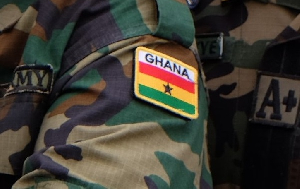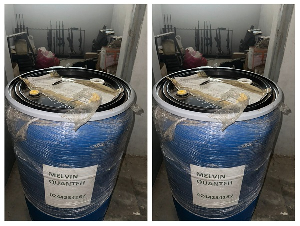Accra (Greater Accra), 16 Feb '99 - Ghana Water and Sewerage Corporation (GWSC) is bankrupt and is surviving on the magnanimity of a host of benefactors, Mr Charles Agyei, Managing Director of the Corporation said today. Speaking at a public forum to present proposals for higher tariffs submitted to the Public Utility Regulatory Commission (PURC) a week ago, he said the government owes GWSC over 60 billion cedis. "... the Corporation is in serious financial difficulties due to policies implemented in the past. There is an urgent need to save the Corporation from its financial difficulties to continue to provide this vital service". Mr Agyei said the Corporation is unable to secure loans from any bank since their financial position cannot support it. "The Corporation's financial portfolio is currently made up of 10 per cent equity and 90 per cent debt," he said, adding "we have exhausted all our loan capacity." He said GWSC produces potable water at 1,400 cedis per 1,000 litres and sells at 1,095 cedis.
"By this, we mean GWSC produces one gallon of water at 6.4 cedis and is compelled to sell to customers at 4.6 cedis a gallon". GWSC is demanding a 76 per cent increase in its tariffs. Mr Agyei said last year the Corporation secured an increase in water tariffs but recorded an annual deficit of 6.9 billion cedis. He said this is aside of the 59.9 billion cedis deficit recorded the previous year adding "the deficit this year is likely to hit 47.7 billion cedis". In 1986, government stopped payment of subsidy to the Corporation and agreed to approve increases in tariffs regularly in order to ensure that the Corporation achieved self sufficiency in financing its recurrent costs and acquired capacity to expand services. "This commitment has never been fully honoured and over the years, periodic tariff increases have lagged behind the level of inflation, resulting in heavy deficit corporate financing". GWSC has never recorded any profit in the 34 years of its existence.
Mr Agyei said the Corporation was aware government had a social responsibility to provide water but the public must also realise that water supply had important economic and financial implications. He said hospitals, universities and other government educational institutions owe GWSC 18 billion cedis and they did not appear capable of settling because they had not shown any commitment to paying. Mr Agyei said GWSC owes the Electricity Company of Ghana (ECG) over 30 billion cedis which cannot be paid "since the Corporation has not got the money to pay". "If ECG decides to cut supply to us now, operations would run to a halt. We are just surviving on the magnanimity of ECG and other institutions to run the Corporation". Mr Agyei said total expenditure for 1999 is estimated at 154.9 billion cedis. This is made up of operating cost of 102.7 billion cedis with a non-operating component of 52.2 billion cedis. The hikes in electricity tariff, sector inflation and other macro economic factors justify the increase being demanded.
"Electricity costs are expected to increase from about nine billion cedis last year to an estimated 27 billion cedis this year. Chemical costs are expected to move from about six billion cedis in 1998 to over 10 billion cedis this year...other financial obligations continue to exert heavy pressure on the cash flow of the Corporation". The Managing Director said the new tariffs being requested cannot even help the organisation to break even. He said the Corporation has put a number of measures in place to ensure greater efficiency.
These include emphasis on accurate and timely billing, arrears management, improvement of customer services as well as decentralisation of operations and restructuring of the commercial department. "Management has also initiated measures such as increasing consumer metering by an additional 40,000, complete installation of 62 bulk metres and 542 zonal meters. This was suspended last year due to financial difficulties ...". During the forum, participants suggested a 30 to 40 per cent increase. They said anything more than this would be unacceptable and be rejected. The GWSC must aim at collecting at least 50 per cent of its arrears before embarking on any increases, they said. Participants from Accra New Town, Nima and Madina said they did not see any justification for any upward review since their taps did not run.












